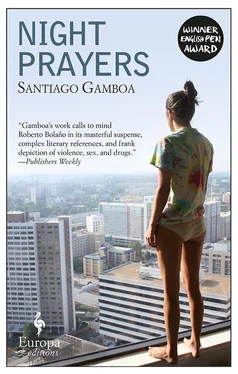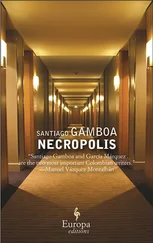“You won’t believe what’s going on, Consul,” she said. “The prosecutor told the Ministry of Justice and the Royal Palace what I was intending to do, and you know what? They’re offering me two million dollars in reparation provided I drop my suit.”
I was silent for a moment, then asked, and are you going to accept?
Of course not, she said. For Manuel and for my son Manuelito, for the memories and the pain and so that my child, who is the continuation of my brother, can live a different life, in a different world. No, Consul, I didn’t accept the two million.
“Really?”
“I asked for four,” she said. “And I assure you they’ll give it to me.”
At that moment the line went dead, and although I kept trying I couldn’t get through again.
A few days later I called Teresa and told her about Juana. She thought it strange that Juana had left Bangkok without saying goodbye. Then, my curiosity aroused, I called the prosecutor’s office (I’d had his card since our first encounter) and, much to my surprise, he himself answered. I asked him about the new bandits who must be sleeping in Bangkwang, but suddenly he cut me off and said, why are you calling me?
I told him that I had learned some details in the case of young Manrique and expressed my gratitude for the way in which the Ministry was handling it.
“What are you talking about?” he cut in again. “That file’s been closed since the repatriation of the body and the official note of condolence. The Ministry hasn’t reopened it, or heard from anybody, or had any contact with the lawyers or the family members. The case is closed. What details are you referring to?”
“Forget it,” I said. “I think I’ve been ill-informed.”
I immediately called the lawyer and asked him about the supposed lawsuit and the offer of two million dollars.
After a silence, he said:
“I don’t have the slightest idea what you’re talking about, Consul. The last time I spoke with her you were present… Compensation? For heaven’s sake, don’t make me laugh. You Westerners will never understand anything.”
After a somewhat contemptuous guffaw he said:
“Excuse me, do you have any other questions?”
“No, thank you for your time.”
I called Juana’s Paris number, but there was no answer. I checked on the Internet what district it corresponded to, but didn’t learn much: it was the number of a public telephone in a shopping mall in La Défense.
I searched for her in vain through the Colombian Consulate in Paris, and wrote to her again but never got a reply.
My curiosity aroused, I dialed her parents’ number in Bogotá. It was the only other thing I could think of. The only thing I hadn’t yet done. As the phone started ringing at the other end, I felt my lip trembling slightly. I already feared what I was quite likely to hear. At last a woman’s voice answered. It turned out to be the mother. I introduced myself as the consul who had handled the administrative part of her son’s case. She thanked me and called her husband (“Come, it’s about Manuel, come on!”). The father’s voice sounded older than I had imagined: he said the family would be eternally grateful for everything that had been done, and that he had already written a letter to the Ministry. I said I wanted to personally express my condolences to him and to Manuel’s mother and sister, but he replied:
“We’re very grateful, Consul, although you ought to know that unfortunately his sister also abandoned us.”
“I didn’t know,” I said, “I’m very sorry.”
There was a silence. I could have sworn he was wiping away a tear.
“She disappeared four years ago, Consul, you know, this country is dangerous. There are families nothing ever happens to, and others like ours. Things have gone badly for us.”
I hung up after more condolences and sat there thinking about shipwrecks, about Géricault, Aivazovsky, and Hokusai.
About Juana.
Once again she had disappeared.
9. INTER-NETA’S FINAL MONOLOGUE
They are going around saying that I am the mistress of silence: that I am the prostitute, the fancy woman, the lover. The whore of silence. But what can I do if every time I think, I prefer to keep quiet, to imagine empty spaces, to smile at nothingness. I am about to do it one more time, like my Sleeping Beauty: to go to a place where the grim heartbeat of the world, the mechanism of this weary planet, can’t be heard, to escape to where the air and life are silent matter. I want to absent myself, to leave.
And how is the poem of silence, how can it be?
Oh, it will be a construction of words like zephyrs, a surface made of clouds, a volcano of signs. How do I know?
For a start I have to choose a poem in which to hide myself, a poem whose words will serve as a screen to block the light, its verses like cliffs protecting my little island from disaster and the sadness of the world. I have already lost almost everything. I’m not brave: just a fragile grain of sand.
One day passes, two days, three, and I have decided.
I will hide myself in a poem by Roque Dalton, murdered by his own comrades, his own friends! It’s one of the greatest demonstrations of idiocy in history. Oh, the dreams and the words, how they kill. Roque was free and ethereal, as I wish to be. As was somebody I loved very much and who is no longer with us. So now I leave them, perhaps forever.
I take my leave with my poem-home, my poem-world:
LATE AT NIGHT
When you learn that I have died do not utter my name
because death and repose would be delayed.
Your voice, which is the bell of the five senses,
would be the dim lighthouse sought by my fog.
When you learn that I have died utter strange syllables.
Say flower, be, tear, bread, storm.
Do not let your lips find my eleven letters.
I am tired, I have loved, I have earned silence.
Do not utter my name when you learn that I have died,
from the dark earth it would come through your voice.
Do not utter my name, do not utter my name.
When you learn that I have died do not utter my name.
I have already filled six notebooks. I’ve listened, imagined, walked around Bangkok, and revisited a few places. I have fantasized, remembered, and written.
Tomorrow I shall leave without having really seen anybody (Teresa hasn’t lived here for some time now). Nothing except the sound of old words that at the time nobody listened to. Well, only me. Now I have to organize them, reconstruct the story, and try, once again, to give them a meaning.
In The Last Tycoon , Elia Kazan’s film of the F. Scott Fitzgerald novel, with a screenplay by Harold Pinter, the main character, played by Robert De Niro, twice tells the following story: a woman rushes home and empties the contents of her purse on the table in the entrance hall: change purse, glasses, a nickel, a brush, a box of matches, and a lipstick. Cursing, she grabs the nickel and the box of matches, and then nervously takes off her black gloves and throws them angrily into the gas stove. She lights a match and brings it close to the stove, but just as she is about to light it the telephone rings. The woman hesitates, curses again, and finally answers.
After listening to something she shouts into the receiver:
“I already told you, I never owned any damned black gloves!”
She slams the phone down and goes back to the stove, is about to light it, but at that moment realizes that there is someone else in the room, someone who has seen what she has done.
Читать дальше












